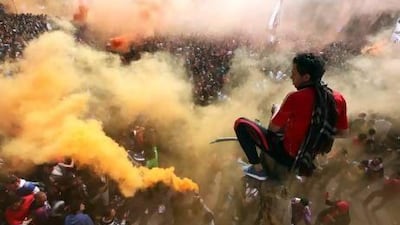CAIRO // A court verdict over a football riot that has convulsed Egypt for more than a year led to more deadly protests and the torching of buildings in Cairo.
Judges confirmed 21 death sentences but acquitted seven police officers over the riot in Port Said in February last year, when supporters of the local Al Masry club attacked visiting Al Ahly fans from Cairo and 79 people died.
After Saturday's rulings, football fans in Cairo were enraged at the seven acquittals. Two protesters were killed, one from shotgun pellets and one from suffocation, in clashes with the police, and a police building and Egypt's football association headquarters were set ablaze.
In Port Said, fans were equally furious at the confirmed death sentences, and the army moved to protect the Suez Canal after protesters placed burning tyres along the harbour in a bid to shut down the shipping corridor that is one of Egypt's biggest foreign currency earners.
To compound the security nightmare for the president, Mohammed Morsi, the new violence erupted the day after many police officers went on strike. They are frustrated at being blamed for deadly crackdowns on protesters, and they accuse Mr Morsi of using them to fight his enemies.
Some units in at least 10 of the 29 provinces sealed their stations with chains and called for the removal of their boss, the interior minister, Mohamed Ibrahim, who was appointed by Mr Morsi.
Egypt was already on edge in anticipation of yesterday's court rulings, which confirmed the 21 death sentences and issued verdicts on 52 other accused. Twenty-four were sent to prison, five of them for life, and 28 were acquitted, including the seven police officers.
A media adviser for the Muslim Brotherhood's Freedom and Justice Party, Mourad Ali, criticised the protests. "Those benefiting from chaos are not the simple workers or the peasants or the employees seeking a better living, but it is those who seek to defend their corruption," he wrote on Facebook.
"Together we made a revolution to establish a state of law, which respects judicial decisions and provides fair retribution. Regardless of whether we are satisfied with the verdict or not, we should respect it and [if necessary] use legal measures to appeal it."
The Port Said football riot case has caused security problems since January when the 21 people, mostly Al Masry fans from Port Said, were first sentenced to death.
The Cairo fans accuse the police of collusion in the killing of their fellow supporters, and claim they had advance knowledge of plans by supporters of Al Masry to attack them. They also accuse them of standing by as the Port Said fans set upon the visiting Al Ahly supporters.
More than 60 people have died in clashes with the authorities since the initial verdict.
Yesterday, on the upmarket island of Zamalek in Cairo, helicopters dropped water on the smouldering buildings of the Egyptian Football Association and the nearby Police Academy Club while firefighters were on the scene until the evening. Investigators found flares and Molotov cocktails at the police building, where officers socialised and hosted weddings. It was completely ransacked with most of the windows smashed.
Many suspected the hard-core Al Ahly fans, known as Ultras, of the attacks on the buildings but some of their members denied any involvement.
"We were actually celebrating the sentences when we heard fire trucks," said Amr Sabry, 21, an Ultra standing yesterday in front of the football association building.
"Of course, the government will blame us, but we know that the people who did this were not from our groups. The Brotherhood is causing a division in our country and this is the result."
Police also battled protesters in Tahrir Square, firing tear-gas canisters at groups of young men throwing rocks at officers.
Mr Morsi has promised to reform the security forces but has struggled to assert any control.
The interior ministry raised the security status in Sinai peninsula to a "level of emergency" after receiving intelligence that Islamist extremists might launch attacks there, according to the state news agency, Mena.
Mr Morsi, a former top official of the Brotherhood, set his administration on a collision course with liberals, moderate Islamists and secularists in November when he issued a decree protecting his decisions from judicial oversight and rushed through a vote on a controversial new constitution.
He backtracked on the decree and the constitution passed in a nationwide referendum, but the perception of Mr Morsi as an autocratic leader bent on taking over all arms of the state stuck in the minds of opposition groups. Their umbrella organisation, the National Salvation Front, has opposed his decisions at every point and have threatened to boycott parliamentary elections to in a bid to delegitimize his government.
An administrative court last week overturned Mr Morsi's decree for elections to start in late April because the law should have been vetted by the Supreme Constitutional Court before ratification. It is unclear if or for how long parliamentary elections will be delayed.

